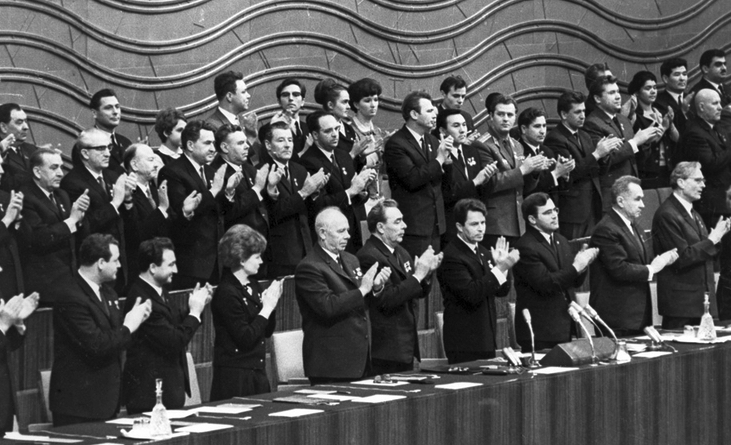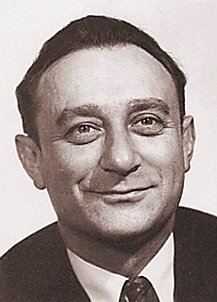
- Articles
How Operation SOLO Helped Prevent World War III by Miguel A. Faria, MD
Operation SOLO was a sensitive operation against the Communist Party of the USA (CPUSA) that rapidly evolved into a deep penetration of the leadership of the Soviet Union conceived by the Federal Bureau of Investigation (FBI) and carried out by three patriotic and determined Americans: Morris Childs, his wife Eva, and his brother Jack.
In his book Operation Solo: The FBI’s Man in the Kremlin (1996), journalist and Soviet espionage historian John Barron, recounted how over a 27-year period Morris Childs conducted 52 clandestine missions into communist nations like the Soviet Union, China, and Cuba, as well as to parts of the Soviet empire in Eastern Europe. The missions usually lasted several weeks at a time. Nikita Khrushchev, Leonid Brezhnev, Yuri Andropov, Mao Tse-tung, Fidel Castro, and Nicolae Ceausescu trusted him both as a friend and confidant.
Saving the World From Mutual Destruction
As a member of the CPUSA since 1919, Morris was considered a reliable “old Bolshevik,” and was made advisor to the International Department of the Central Committee (Comintern). He was so esteemed by the Soviet leadership that Leonid Brezhnev awarded him the Order of the Red Banner, for impeccable service. During those 27 years of service, his loyalty to international communism was never questioned; nor did the communist leaders ever learn that Morris was working for the FBI.
Historians Harvey Klehr and John Earl Haynes wrote that, “Operation SOLO was a long-running FBI program to infiltrate the Communist Party of the United States and gather intelligence about its relationship to the Union of Soviet Socialist Republics, China, and other communist nations.” Officially, Operation SOLO began in 1958 and concluded in 1977. However, “two of the principal agents in the operation had been involved with the Bureau for several years prior”; and one of them, since 1952.

Morris Childs (codenamed “58”), his wife Eva, and his brother Jack Childs had been active members of the CPUSA. When the trio became disillusioned with communism and the CPUSA, the FBI recruited them, and they agreed to work with the Bureau. The three courageous Americans became deep penetration FBI agents into the leadership of the Soviet Union and other communist nations.
While on missions, Morris enjoyed unparalleled access to the Soviet leadership, including two prominent Soviets—namely, Boris Ponomarev, head of the International Department of the Central Committee, and Mikhail Suslov, chief of Ideology for the Central Committee.
Eva Childs, Morris Childs’ second wife, became a spy in her own right, traveling with Morris, providing cover, and transcribing messages and documents. Eva and Morris would “hide underneath bed covers in Moscow copying secret Soviet documents, one holding a flashlight while the other wrote,” and then “smuggle out the copies encased in plastic wrapped around their bodies.”
Jack Childs became the conduit for the transfer of funds from the USSR to the CPUSA. Over the years, the CPUSA “received more than $28 million from Moscow, which the FBI counted down to the penny.” Subsequently, Jack Childs was also awarded the Order of the Red Banner by the Soviets.
The intelligence gathered through Operation SOLO provided American presidents, including Richard Nixon, Gerald Ford, and Jimmy Carter, as well as secretaries of state and national security advisors, like Henry Kissinger, with a virtual “window into the Kremlin.” From 1958 to 1977, the U.S. knew what discussions took place in the Kremlin; what the political and economic situation really was in the Soviet Union; and what foreign policy initiatives would be undertaken. In short, the U.S. knew what was brewing in the minds of the Soviet leadership and their worries and fears.
Moreover, because of the intelligence, American leaders understood how to respond, how to negotiate, and how to exploit Soviet vulnerabilities, but also how to assuage the leaders’ minds when tensions escalated.
Exploiting the Very Real and Dangerous Sino-Soviet Split
From intelligence provided by Operation SOLO, Nixon and Kissinger learned that the Sino-Soviet split was real and deepening, reaching dangerous levels of confrontation between Russia and China. The two communist behemoths had become implacable enemies.
The Chinese demanded that the Russians “recant their repudiations of Stalin, abandon the policy of ‘peaceful coexistence’ with the West, renounce the doctrine that World War III was not inevitable… In essence, [the Chinese] demanded that the Soviet Union, ‘domestically and internationally,’ revert to Stalinism.” The Chinese negotiators insulted the Russians, accusing them “of cowardice for not looking forward to nuclear war.” The Russians were astounded. They believed in the Doctrine of Correlation of Forces—that is, that they should not fight a war unless they were certain of victory:
In a nuclear war with the United States, victory was far from certain; obliteration of all Soviet cities and basic industry was. Soviet strategists comprehended that whatever the other outcomes, nuclear war would leave them with a depopulated, primitive agrarian society vulnerable to hordes of Chinese. The Chinese professed not to fear nuclear war. They did not understand that it would return them to the Stone Age, and they believed they could afford to lose a few hundred million people, people being the one thing they had in abundance. Hence, the Soviets, in defiance of what the Chinese considered fundamental rules of fraternal Marxism, refused to share nuclear weapons and withdrew technical assistance.
Moreover, Mao refused to help the Soviets in the Vietnam War or to allow Soviet aircraft to fly over Chinese territory to aid the communist Vietnamese. On April 25, 1965, within a plastic wrapping, Eva carried secret intelligence that had been submitted by the Soviet analysts to the Kremlin leadership.
Mao Tse-tung’s hatred of both Nikita Khrushchev for abandoning Stalinism and Leonid Brezhnev for pursuing détente with the West provided the optimal time for the U.S. to approach China. The SOLO files “offered a clear road map to China,” and “made clear that the Chinese would likely welcome American overtures.”
Because of Operation SOLO, Nixon and Kissinger were able to exploit the Sino-Soviet Split. And following Morris Childs’ advice, they visited China, befriended Mao and Chou En-lai, and, in effect, developed a geopolitical alliance against the Soviets. The Russians were so frightened by the warming of international relations between China and the United States that they pursued détente even more avidly than before.
Given the uneasy political climate that existed in the United States following President Nixon’s resignation from office in 1974, the FBI felt it necessary to inform the new president, Gerald Ford, and Secretary Kissinger “about the origins of the ‘Special Source.’ ” After the briefing on the source of the intelligence, Henry Kissinger told the FBI agents, “This is a window not only into the Kremlin but into the minds of the men in the Kremlin. This is fabulous.” President Ford and Secretary of State Kissinger continued to use the information gathered and analyzed by Morris Childs to exploit Soviet foreign policy fears and vulnerabilities.
Perfidious Congressional Investigations Threatened SOLO
Unfortunately, in the wake of the Watergate scandal, congressional investigative committees almost destroyed Operation SOLO and its “window into the Kremlin.” The Church Senate Select Committee and other congressional investigations drilled U.S. intelligence agencies and threatened to expose and derail the entire operation, endangering the lives of Morris, Eva, and Jack Childs. When the FBI advised terminating Operation SOLO for security reasons, Henry Kissinger objected. He stated that he had to have SOLO’s intelligence for his dealings with the Soviets. Kissinger concluded his remarks to the FBI, explaining that, “while he respected the judgment of the FBI, SOLO must go on and it would go on. The FBI comprehended that if it did not comply with his dictate, it doubtless would receive a comparable, and possibly less genial one from the president.”
Morris Childs could deal with Moscow, but the investigations and recriminations going on in Washington against America’s security agencies worried him intensely. After returning from a four-week mission to Moscow in March 1976, it was obvious that “anxiety about what might happen in Washington had added to the physical stress imposed by a business and social routine that would have exhausted a much younger and healthier man.”
In his last trip to the Soviet Union at the end of 1977, when Morris and Jack were awarded the Order of the Red Banner, Morris had reported to his FBI handler, “Right now, we’re alright in Moscow. It’s Washington we have to worry about.” In fact, as a result of the unending investigations, leaks to journalists and other officials and further danger to their mission, the FBI terminated Operation SOLO after decades of astounding intelligence results.
The trio was exhausted after nearly thirty years spying for America. In 1987, the Morris brothers became the first spies to be decorated by both the Soviets and the Americans when Ronald Reagan (1911–2004) awarded them the Presidential Medal of Freedom!
This article is excerpted and edited from Dr. Faria’s book, Stalin, Mao, Communism, and the 21st Century Aftermath in Russia and China (2024).
Dr. Miguel A. Faria is Associate Editor in Chief in neuropsychiatry; and socioeconomics, politics, and world affairs of Surgical Neurology International (SNI). He is the author of numerous books, the most recent, Cuba’s Eternal Revolution through the Prism of Insurgency, Socialism, and Espionage (2023); Stalin, Mao, Communism, and Their 21st-Century Aftermath in Russia and China (2024); and Contrasting Ideals and Ends in the American and French Revolutions (December 2024)—the last four books by Cambridge Scholars Publishing, Newcastle upon Tyne, U.K.
Copyright ©2025 HaciendaPublishing.com
1 thought on “How Operation SOLO Helped Prevent World War III by Miguel A. Faria, MD”
Very interesting. I didn’t know about this operation. I did ask someone (a Sovietologist) if the split between China and the USSR was real, and he had qualms about their relationship. Great article as always. Congratulations to Miguel and I look forward to his new book.